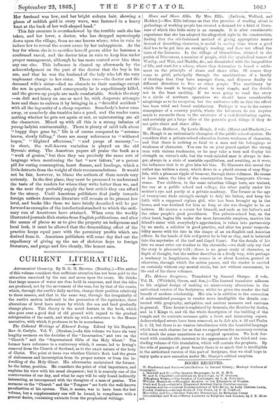[Villain Bathurst. By Lewis Hough. 3 vols. (Hurst and Blackett.)—
Mr. Hough is an enthusiastic champion of the public school-system. He considers that a private-school education fosters weakness of character, and that there is nothing so fatal to a man and his belongings as weakness of character. You can be on your guard against tho strong man with vicious tendencies, or ho may take a turn and display his strength on virtue's side, but the weak-minded man is always in dan- ger, always in a state of unstable equilibrium, and awaiting, as it were, the influence that is to give him his bias. To illustrate this moral the author has written a story, which flows in a placid stream of easy Eng- lish, with a pleasant ripple of humour, through three volumes. He seems to have taken the idea of the construction from Tennyson's Circum- stance. Two children, in the same suburban village born, are trained, the one at a public school and college, the other partly under his mother's eye and partly at a private academy. The former at the age of twenty-one finds strength enough to defy his father, and keep his faith with a supposed orphan girl, who has been brought up in the house; and was destined for him as long as she was thought to be an heiress. He creates a career for himself, and ends as his father's and the other people's good providence. The private-school boy, on the other hand, begins life under the most favourable auspices, marries his friend's sister with everybody's approbation, is taken into partnership by an uncle, a solicitor in good practice, and after ten years' respecta- bility meets with his fate in the shape of an ex-English and Austrian officer. In the hands of this evil potter he is but as clay, and is inducted into the mysteries of the turf and Capel Court. For the details of his fate we must refer our readers to the chronicle,—we shall only say that the story is pleasantly told ; there is no great study of character, or depth of thought, but the author describes in a lively way, with perhaps a tendency to lengthiness, the scenes in or about London, genteel or otherwise, through which the action passes, and the reader is carried on certainly without any mental strain, but not without amusement, to the end of the three volumes.






























 Previous page
Previous page